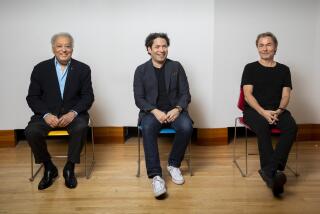MUSIC REVIEWS : I Cantori Joins With Angels Consort
- Share via
Credit Edward Cansino and his vocal ensemble, I Cantori, with an inspired notion when on Sunday afternoon they presented in Bel-Air Presbyterian Church, 300 years to the day of its premiere, Purcell’s glorious “Ode on St. Cecilia’s Day.”
The event was spiced by the participation of a new period-instrument orchestra, the Angels Consort, directed by a young veteran of the antiquarian movement in Southern California, violinist Jolianne von Einem.
The confusingly named Angels Consort--a musical organization named Consortium Angeli already operates locally--proved to be the positive focus of the event, displaying suave, well-balanced strings, clean-toned trumpets and an alert contingent of continuo players. A promising debut.
On the whole, however, debits outweighed credits on Sunday, and they could be attributed chiefly to conductor Cansino’s slowly paced, doggedly low-key and unincisive interpretive approach, exacerbated by the church’s mushy acoustics.
The flights of imagination with which Purcell illuminated the Dryden-based text by Nicholas Brady (unpardonably absent from the program leaflet) remained earthbound.
I Cantori, numbering 20 singers for the occasion, were well prepared, singing with consistent sweetness of tone and clarity, while the soloists could be admired for their ability to cope.
Countertenor Dana Marsh had to do the most singing, and the most coping, what with the grueling tessitura of his music made doubly taxing by the conductor’s breath-defyingly slow tempos. And baritone Norman Goss showed his aplomb by keeping the aria “Wondrous Machine” rhythmically aloft.
Incidentally, the presence here and elsewhere of that machine, the organ, would have been a nice touch. But Cansino chose to ignore the text’s implicit invitation.
In sum, Cecilia, the patron saint of music, should have been honored with less reverence, more joy than proved to be her lot on Sunday.
More to Read
The biggest entertainment stories
Get our big stories about Hollywood, film, television, music, arts, culture and more right in your inbox as soon as they publish.
You may occasionally receive promotional content from the Los Angeles Times.










